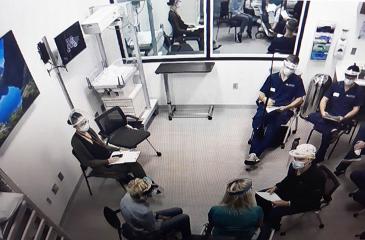Training designed to improve communication in clinical settings
Communication between health care professionals and patients plays a significant role in quality of care and patient safety, which in turn contributes to patient outcomes.
“Recent data has shown us medical errors caused by communication or miscommunication disproportionately affect limited language patients,” said Anne Woll, MS, M Simulation’s education director. “To help overcome language barriers and provide the best possible care for all patients, we have developed simulation training events focused on interprofessional partnerships between health professional students and spoken language interpreters.”
Since 2016, M Simulation has collaborated with the School of Dentistry and interpreting partners to develop and implement simulation education to help address disparities for dental patients with limited English proficiency. The simulation workshop allows dental students to work with interpreters as they navigate through a series of standardized patient (SP) scenarios that focus on communication. SPs are trained by SP educators at M Simulation to portray non-English speaking patients who communicate with the interpreters in the scenarios.
“One of our goals for this training was to create new connections between our dental students and interpreters—who traditionally have trained separately. Interpreters generally have not been viewed as part of the health care team, even though they play a critical role in clinical care,” said Karin Quick, DDS, PhD, associate professor of dentistry. “By bringing together students in spoken language interpreting to work side-by-side through simulation with our health professional students, we learned a lot about how to work as a team. That approach to teamwork changes how health professionals can relate to their patients.”
Learners who have participated in these trainings say building trust with the interpreters was particularly beneficial.
“We see patients from so many backgrounds in clinic, and we need those foundational skills to communicate with them and treat them,” said Colton Cannon, a DDS/MPH student. “Learning how to best work with interpreters is so important because they aren’t just translators, they're an important part of providing care through delivering and receiving information. A lot of times…you don't know how to properly articulate things, so being able to practice that in this training was really insightful.”
Dentistry student Margaret Klein says, “I had never worked with an interpreter in a patient encounter. This workshop gave me confidence, skills, and a better understanding of the interpreter resources we have available for our patients.”
Quick says students who participate in these workshops realize just how important communication is in the clinic. “Students understand they have to ask themselves, how do I know the patient understands enough about their diagnosis to make an informed decision about their care? Things can quickly and easily break down in communication—whether it’s because you think you're communicating when you're not, or because you're actually miscommunicating,” she said.
While this training is currently offered to third year dental students, work is underway to expand the offering to other health professional learners and practicing providers through a CDC and MDH funded grant initiative. Hope Pogemiller, MD, MPH, assistant professor of medicine and pediatrics, is the lead investigator for this project, joined by Quick, Woll and Lou Clark, PhD, executive director of M Simulation. This project aims to improve health care for newcomers to the United States.
Standardized patient scenarios allow peer-to-peer learning
The training includes an orientation and simulation stations in which learners work through a number of patient encounters, starting with introductions and ending with informed consent. Because students work in groups, they learn not only by participating themselves, but also by observing their peers during the SP encounters.
“I appreciated being able to observe how other students approached things during these simulated scenarios,” said Cannon. “In clinic, patient scenarios are often unique experiences, which means our approach isn’t necessarily transferable from person to person. In this training, we were able to see and learn how it’s supposed to be done. For me, I enjoyed being able to reflect on what I did and gain insights into what others have done.”
SPs portraying limited language patients brings authenticity to the clinical simulations
SPs are community members who are trained by SP educators to portray patients’ medical histories, physical findings, and emotional or behavioral characteristics during teaching and assessment activities. They are also trained to provide learners with constructive written and verbal feedback, and to assess learners. While M Simulation regularly recruits diverse individuals for its SP program, this training adds an additional layer of need in which interpreters and SPs must speak the same language other than English.
Klein says, “The SPs are phenomenal. They allow for this training to even exist! Every scenario was a plausible real life situation, and their skills allowed us to become completely immersed in the situation.”
SPs also play a significant role in providing feedback during these simulated clinical encounters.
“At the end of the simulation, SPs share their perspective of how the communication flowed and how it felt for them as a patient,” said Woll. “In health care, providers don't often get the opportunity to hear how the patient feels about the clinical encounter, so having this immediate feedback is an important way for our students and faculty to learn.”



